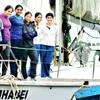Inside the life of a woman in the Indian Navy with gallantry medal awardee Aishwarya Boddapati
Aishwarya Boddapati, a former lieutenant commander with the Indian Navy, who was part of the historic Navika Sagar Parikrama mission, recently took voluntary retirement. In this exclusive interview with HerStory, she talks about her voyage, applying for permanent commission, and more.
Aishwarya Boddapati, a former lieutenant commander with the Indian Navy, achieved the status of a decorated naval officer within a decade of joining the armed forces. She is one of the first women naval officers to receive the Gallantry Nao Sena Medal in 2018.
She has also been honoured with the Nari Shakti Puraskar and Tenzing Norgay awards for being part of the all-women crew of the Indian Naval vessel Tarini’s Navika Sagar Parikrama mission which circumnavigated the globe in 254 days.

The all-women Navy officer team aboard INSV Tarini with retired naval officer Captain Dilip Donde; Pic credit: Indian Navy
Hailing from Hyderabad, Aishwarya joined the Indian Navy in 2011 and served in several departments including naval construction, maintenance and upkeep of warships, passage planning of NSP initiative among others.
In June 2021, she opted for voluntary retirement after applying for permanent commission twice and being told that she fell short on merit.
Joining the navy
Aishwarya, who always wanted to become a pilot in the Air Force, studied metallurgical engineering from Mahatma Gandhi Institute of Technology, Hyderabad.
However, after completing her studies, she realised there weren’t many jobs available for female metallurgical engineers as almost all of them involved fieldwork.
Then, she chanced upon an advertisement in the newspaper where the Indian Navy was looking for male and female candidates. She applied and passed the requisite tests and joined the Indian Naval forces in 2011.
While permanent commission may still be a challenge for women officers, entering the armed forces has definitely become easier, Aishwarya says, adding that her batch had one of the highest numbers of women — 70 out of a total of 256 officers.
Behind the scenes of the voyage
In 2016, Aishwarya was selected to be part of Navika Sagar Parikrama Mission.
The naval officers touched five countries, crossed the equator twice, sailed across four continents, and three oceans, completing 21,600 nautical miles in eight months from September 2017 to May 2018.
“People thought that we were on a gala trip but no one noticed the amount of hardships we went through to stay afloat. We were under pressure for a lot of things. We were so worried about the boat capsizing as it cost around five to six crores of public money. We didn’t want to fail as nobody wants to hear a failure story.”
The pressure of proving themselves and making the mission a success was high. Reflecting upon it, Aishwarya says she couldn’t enjoy the voyage as much as she would have liked.
“People thought that we were on a gala trip but no one noticed the amount of hardships we went through to stay afloat. We were under pressure for a lot of things. We were so worried about the boat capsizing as it cost around five to six crores of public money. We didn’t want to fail as nobody wants to hear a failure story,” she tells HerStory.
On a lighter note, it changed her stance on tea. “I am a coffee person but during the expedition, we fought about it so much that now if I am in a colder place, I only want to have tea so I call up Payal (Lieutenant Payal Gupta) to ask for the chai masala,” she laughs.

Celebrations during the Navik Sagar Parikrama mission, Aishwarya Boddapati (3rd from Left) along with her crew; Pic credit: Team Tarini's blog
While the other crew members Lieutenant Commanders Vartika Joshi [Captain – first skipper of INSV Tarini], Pratibha Jamwal, P Swathi, and Lieutenants S Vijaya Devi and Payal Gupta were already familiar with sailing, it was Aishwarya’s maiden voyage.
Breaking into a boy’s club
While Aishwarya achieved great heights and broke many barriers as a naval officer, gender biases continued to affect her career.
She recollects how even circumnavigating the globe wasn’t “a show of bravery for many male officers” in the navy.
“I heard statements like who gives a gallantry medal for an adventure activity, and these girls don’t deserve it.”
“While the nation knows the six of us as we went on the NSP mission, women officers have struggled to reach the ranks they have. All officers are committed to serve the country but for women officers, their commitment is judged on the basis of gender. I have noticed women being judged on their commitment if they have children. When the father is in the Navy, he doesn’t have to suffer such judgments.”
Aishwarya emphasises, “Equal opportunity is our right and we deserve it.”
She speaks of an instance of stray comments being passed when the NSP crew was being considered for the gallantry medal, “I heard statements like who gives a gallantry medal for an adventure activity, and these girls don’t deserve it.”

Lt. Cdr. Aishwarya with Lt. Pratibha Jambwal and Lt. Payal Gupta (L to R) at the press conference in New Delhi after the successful completion of Navika Sagar Parikrama mission.
Struggle to continue in the Navy
Aishwarya never thought she’d have to retire early, given her achievements and the Supreme Court judgment allowing women a chance to be granted permanent commission.
It was in 2019 that she first applied for permanent commission after completing eight years in service and then again in 2020.
“After seven years in the Navy, one can give ‘first willingness’ to be granted Permanent Commission for a maximum of two times. But both times, my application was rejected on the grounds that I was falling short on merit,” the Nao Sena Medal holder says.
“There is no clear indication of what is merit and where one is falling short. In our batch, only two people have a gallantry medal and out of them only I was up for permanent commission,” she adds.
“I realised that if I put up a fight then it would be taken against me. I felt that I am bigger than this and I decided that after completing 10 years of short service, I will step out. I knew I was capable of doing something on my own.”
After being rejected, Aishwarya wrote a letter to the Naval Chief mentioning all that she had achieved in her career in the navy. “I still got the same response that I fell short on merit,” she says.
After completing 10 years of service, Aishwarya left the Indian Navy in 2021.
“I realised that if I put up a fight then it would be taken against me. I felt that I am bigger than this and I decided that after completing 10 years of short service, I will step out. I knew I was capable of doing something on my own,” says Aishwarya, who joined Wells Fargo as Assistant Vice President and Control Officer.

Admiral Sunil Lamba honours Lt Cdr Aishwarya with Nao Sena Medal gallantry; Pic credit: Lt Cdr. Aishwarya Boddapati
In September 2021, after the apex court’s decision, the Centre allowed women entry into the National Defence Academy (NDA) for recruitment into the armed forces, paving the way for a permanent commission. Aishwarya feels elated with this decision. “Some sacrifices had to be made for the greater good and if that is me and others like me then I’ll take it,” she says.
However, she adds, “Even though the SC has passed the judgment and entitled women to be granted Permanent Commission, they will continue to be judged based on gender and every woman in the armed forces is fighting her own individual battle so that will still happen.”
Aishwarya left feedback before taking retirement stating that in her case the procedure of granting permanent commission was not transparent and that should change for her juniors.
HerStory reached out to the Indian Navy and sought responses on permanent commission to its women officers but did not receive any response at the time of publishing this story.
Enough representation?
Incidentally, at 6.5 percent, the Indian Navy has the largest percentage of women compared to the other two services as per Minister of Defence, Shripad Naik. The percentage of women in the Indian Army and the Indian Air Force is 0.56 and 1.08 respectively.
Aishwarya emphasises that as long as women aren’t allowed in all the roles, especially at the soldier level, they will continue to remain underrepresented. She adds that career opportunities available in the armed forces need to be better publicised.
“It has started in some schools but it’s still difficult for children to imagine women as naval officers or fighter pilots. Now that I’ve retired, I try to take up speaking assignments in schools and colleges so I can share my story and tell children they can join the armed forces too,” she says.
According to her, everyone in the country should serve in the Armed Forces.
“There is nothing greater than an opportunity to serve your country. I am proud to have represented my country on such a large platform. By completing the voyage, we could prove that women can do it too,” she signs off.
Edited by Teja Lele









